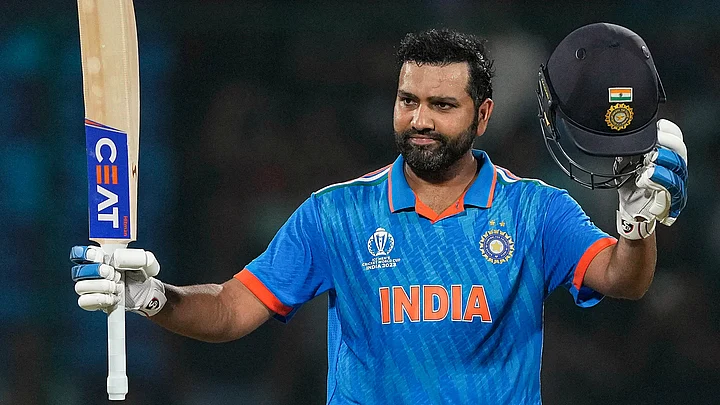If India’s triumph over Australia in their first ICC Cricket World Cup 2023 match was about battling nerves in an escapade, the second victory – an eight-wicket win over Afghanistan in Delhi today – was about flexing muscles. That of supremacy and paramountcy, to prove why the ‘mission to three’ is not just another preposterous dream, but a tenable target.
In their mission, India were led by a leader who scripted history – and not metaphorically – as Rohit Sharma’s century helped India chase Afghanistan’s total of 272/8 in only 35 overs.
Amid intense scrutiny on India’s makeshift opening pair of Rohit and Ishan Kishan, who made a cumulative zero against Australia, and with the target not being too intimidating on a track as flat as that in Delhi’s Arun Jaitley Stadium, a sedate start would not have been much of a surprise.
Instead, Rohit went – as the cliché goes – all guns blazing. 14 runs came from the fifth over, bowled by Fazalhaq Farooqi, with the Indian skipper becoming the fastest Indian batter, and joint-fastest overall (in terms of number of innings), to get to 1000 ODI World Cup runs.
In the next over, Kishan lifted his self-imposed restraining order by striking a couple of boundaries, before Rohit struck two fours and a six in the next over. By this time, the game was all but out of Afghanistan’s grasp, despite India still requiring over 200 runs.
It took India 12 overs to get into triples figures, and it took another 5.2 overs for Rohit Sharma to break more records – not one, but a couple, and both were previously held by legends of Indian cricket.
By scoring a century in 63 deliveries, he recorded the fastest ODI World Cup century by any Indian batter – a record which was previously held by Kapil Dev for his iconic ton against Zimbabwe at the 1983 World Cup, in a game that wasn’t broadcasted. Moreover, he became the first batter to score seven centuries in cricket’s pinnacle competition, surpassing Sachin Tendulkar’s record of six centuries.
Rashid Picks Two Wickets To Spare Afghanistan’s Blushes
Amid the destruction-creation-further-destruction cycle of Rohit, Ishan Kishan was dismissed by Rashid Khan in the 19th over, just three runs before he would have lifted his bat to celebrate a half-century.
That, however, did not deter Rohit one bit, whose incessant hits propelled India to the 200-run mark in only the 25th over. Had he been at the crease till the end, the hosts might have crossed the finish line much earlier than they eventually did, but he, too, fell prey to Rashid in the next over.
The two new batters at the crease, Virat Kohli and Shreyas Iyer chose to not be as ruthless. The intensity dipped a notch, and while a section of fans had hoped Kohli and Naveen would be involved in heated shenanigans again to make up for the lack of boundaries since Rohit’s departure, they opted to embrace each other.
Kohli brought up his 68th half-century in the 35th over, with India adding two more points to their account. At the other end, Shreyas Iyer remained unbeaten on 25.
Hashmatullah-Azmatullah’s Knocks Helped Afghanistan Get To 272
Earlier, Afghanistan did a fairly commendable job of reaching a half-decent total after what was a poor start. Opting to bat first, they lost opener Ibrahim Zadran to a Jasprit Bumrah out-swinger – a weapon in the pacer’s arsenal that is proving to be deadly – in the seventh over.
Rahmanullah Gurbaz and Rahmat Shah tried to mitigate the damage with a 31-run second-wicket stand, before they were both dismissed in the span of four deliveries. While Gurbaz lost his wicket to Hardik Pandya, Rahmat was trapped leg before wicket by Shardul Thakur, who was given an opportunity in Ravichandran Ashwin’s place.
At 63/3, Afghanistan’s fans might have had flashbacks from the opening encounter against Bangladesh, but what transpired was in complete contrast to a collapse. Skipper Hashmatullah Shahidi, alongside youngster Azmatullah Omarzai, were involved in a 121-run stand for the fourth wicket.
After scoring 62 runs, which happens to be his highest score in ODI cricket, Omarzai was bowled by a Hardik Pandya off-cutter, while Shahidi lost his wicket to Kuldeep Yadav after scoring 80 runs.
These twin departures derailed yet again, with the likes of Mohammad Nabi and Najibullah Zadran being unsuccessful in both extending their stays at the crease and scoring runs at a brisk pace. Subsequently, only 48 runs were scored in the last eight overs, at the loss of four wickets.
For India, Bumrah was the showstopper with the ball, recording a four-wicket haul on a pitch that had very little purchase – if anything at all – for the bowlers.
(At The Quint, we question everything. Play an active role in shaping our journalism by becoming a member today.)
